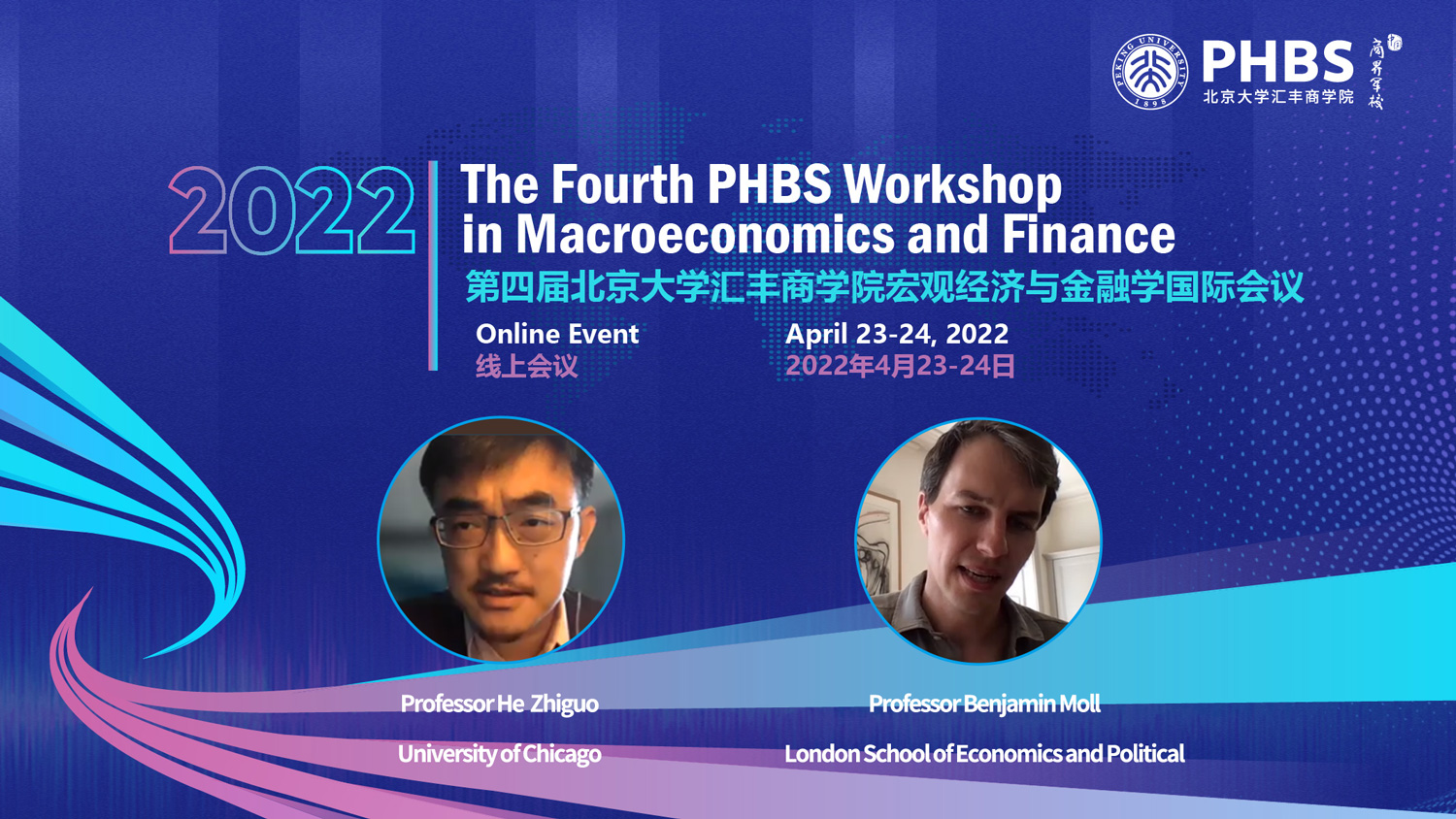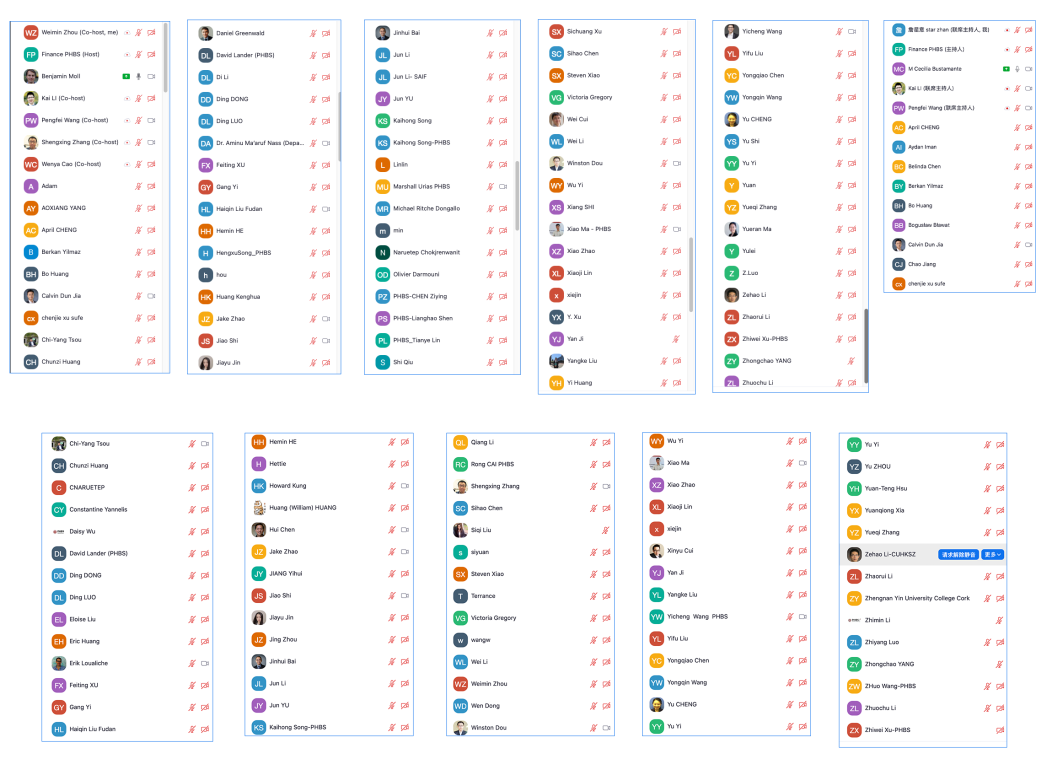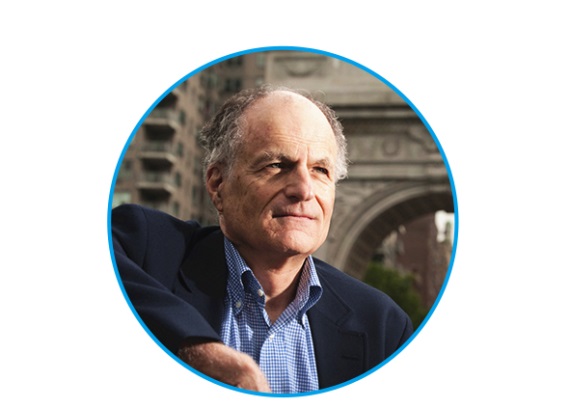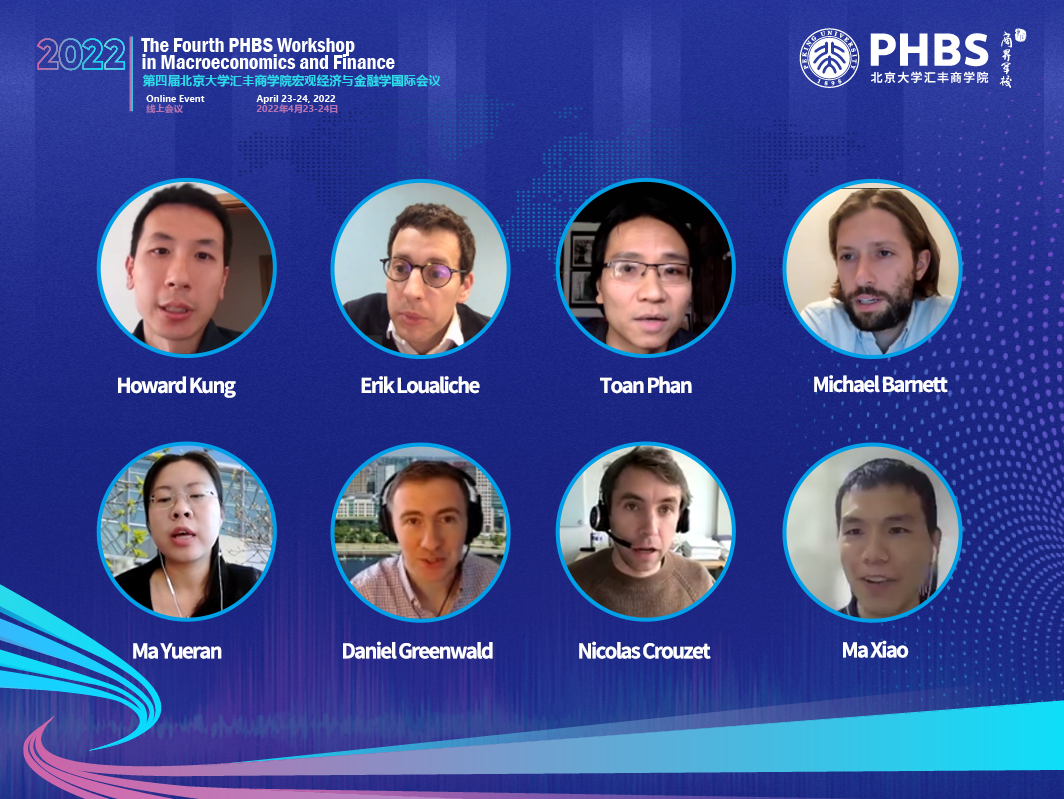Sponsored by Peking University HSBC Business School (PHBS), the Sargent Institute of Quantitative Economics and Finance (SIQEF) at PHBS and the Center for Macroeconomy and Finance (CMF) of Peking University jointly organized the Fourth International Workshop in Macroeconomics and Finance on April 23-24.
The workshop invited renowned scholars and experts from prestigious universities and institutions worldwide, including Massachusetts Institute of Technology, University of Pennsylvania, Columbia University, Duke University, University of Chicago, University of Maryland, Arizona State University, Northwestern University, University of Minnesota, the London School of Economics and Political Science, London Business School, University College London, Peking University, Federal Reserve Bank of Richmond, and Federal Reserve Bank of St. Louis. In spite of pandemic challenges, they converged online to exchange research insights and explore cutting-edge research areas with more than 200 young researchers from home and abroad.
Over 200 scholars attend the online workshop
Professor Wang Pengfei, vice chancellor of PKU Shenzhen Graduate School and dean of PHBS, gives an opening speech
Professor Wang expressed his warm welcome to all the participants and heartfelt gratitude to Winston Dou (assistant professor, University of Pennsylvania), Li Kai (associate professor, PHBS ) and Zhang Shengxing (assistant professor, LSE) for their efforts in organizing the workshop. He introduced the school's academic achievements in 2021, including the selection of our applied economics field into “first class” discipline construction sequence of Guangdong Province, multiple publications in top academic journals, and the recent development of SIQEF. PHBS faculty members published 58 papers in first-class academic journals last year, including 14 papers in top international journals such as
The Journal of Finance,
Journal of Financial Economics,
Econometrica, etc, with a 50% increase in high-quality publications from 2020; In addition, SIQEF has been approved as one of the “Key Laboratory of Philosophy and Social Sciences at Colleges and Universities in Guangdong Province.” After briefing on the workshop’s agenda, he also emphasized the importance of such academic exchanges in macroeconomic and finance during the pandemic.
Professor Thomas J. Sargent, 2011 Nobel laureate in economics and SIQEF director, delivers the opening remarks
Professor Sargent shared his recent discussion with Professor Lars Peter Hansen, 2013 Nobel laureate in economics. He mentioned two primary components of Bayesian analysis: prior distribution and likelihood function, further pointing out Bayesian researchers’ firm subjective beliefs about the prior distributions. Since Aldo Rustichini and his coauthors extended von Neumann and Savage's expected utility theory to variational preferences, he and Professor Hansen have been developing new frameworks in this regard. Based on this, Professor Sargent elaborated on how to deal with decision-making problems when people don’t have a unique prior over statistical models (i.e., likelihood functions) and suspect that each statistical model is misspecified.
Following the remarks, the workshop featured two keynote speeches and four sessions, which included research papers in the fields of macroeconomics and finance. Each presenter had 20 minutes to talk about their research findings, followed by a ten-minute discussion.
 Keynote speakers
Keynote speakers
In the keynote speech, Professor He Zhiguo from University of Chicago introduced his paper “Is There an Industrial Land Discount in China? A Public Finance Perspective.” He pointed out China’s land market featured a substantial industrial discount: industrial-zoned land is an order of magnitude cheaper than residential land. Based on the data of land parcels, Professor He and his coauthors found that the flow of tax revenues from industrial land could quantitatively explain the size of the upfront industrial land discount; in addition, the internal rate of return from the industrial-residential land tradeoff was greater than local governments' cost of capital. Their research has proved that industrial land sales in China are not subsidized relative to residential land sales; and for policy implication, the tax sharing scheme between the central and local governments can be carefully designed to achieve desired land allocation outcomes.
Professor Benjamin Moll from London School of Economics and Political Science presented his paper “Asset-Price Redistribution.” Professor Moll and his coauthors analyzed how the process of continuous asset price growth and buying-selling process could affect the individual welfare growth. Using Norwegian panel microdata from 1994-2015, they conducted the empirical analysis on welfare gains and asset-price redistribution, showing redistribution effects from the young to the old for multiple types of assets, including real estate, bonds, deposits, and warrants. He also elaborated on their simple heterogeneous agent model to quantify the welfare effect of historical asset price fluctuations, and suggested that governments should take asset-price redistribution into consideration to make optimal policy.
Presenters of four sessions
A total of eight papers were presented this year at four sessions. In the Human Capital and Macro Development session chaired by PHBS Assistant Professor Jia Dun, PHBS Assistant Professor Ma Xiao presented his paper “How do Workers Learn? Theory and Evidence on the Roots of Life-Cycle Human Capital Accumulation.” Based on worker qualification data from Germany and the US, Ma and his coauthors found that internal learning (learning through colleagues) decreased with worker experience, while external learning (on-the-job training) had an inverted U-shape in worker experience. To shed light on these findings, they embedded this two-source learning mechanism in a quantitative search framework where firms and workers jointly fund learning investments. Their research shows that subsidizing learning can generate sizeable increases to human capital and aggregate output. Discussant Victoria Gregory from the Research Department of the Federal Reserve Bank of St. Louis gave suggestions on the heterogeneity of learning and training methods, endogenous training mechanism, and data processing refinement.
The other three sessions included Industrial Organization and Asset Pricing, Climate Finance, and Corporate Frictions and Macro Finance, with Assistant Professor Winston Dou, Associate Professor Li Kai and Assistant Professor Zhang Shengxing as each session’s chair.
Initiated in 2018, PHBS Workshop in Macroeconomics and Finance has provided an effective platform for some of the most prominent scholars and young researchers to promote academic exchanges among macroeconomic and financial research institutions, deepen the understanding of China's macroeconomic and financial issues, and facilitate the application of research findings into China’s reform and development.
Video of Keynote Speech:
https://www.bilibili.com/video/BV1814y1Y7H1
http://https://www.bilibili.com/video/BV1e8411t7rd
By Annie Jin



















